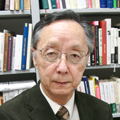Kenichi Mishima
Speaker

Kenichi Mishima, born in 1942, studied comparative cultural studies and German language and literature at the University of Tokyo from 1961 to 1968. Following this, he held an assistant professorship at the Chiba University until 1975. He was a DAAD Fellow at the University of Tübingen from 1970 to 1972, and a Research Fellow of the Alexander von Humboldt Foundation in Bonn from 1978 to 1980. Mishima taught as an assistant professor at the University of Tokyo (Komaba) from 1975 to 1987 and as a full professor at the Gakushuin University in Tokyo starting in 1987 until he received a professorship at the Osaka University in 1991. At Osaka, he held a chair for social philosophy and comparative civilisations until 2004. From 1994 to 1995, he was a Fellow at the Wissenschaftskolleg in Berlin. Since 2004, Kenichi Mishima has been teaching social philosophy and contemporary philosophy at the Tokyo Keizai University. In February he received an honorary doctorate from the FU Berlin. His other distinctions include the 1986 Philipp Franz von Siebold Prize, awarded by the German President, as well as the 2001 Eugen and Ilse Seibold Prize, awarded by the German Research Foundation.
In his philosophical career, Mishima has dealt with critical theory and modern philosophy — in particular the reception of Friedrich Nietzsche und Walter Benjamin—and also with the theory and empiricism of multiple modernities, and with intellectual discourses in Germany. Mishima has published Walter Benjamin – Collection, Destruction, Salvation (1999), Light and Shadows of Nietzsche’s Philosophy (1997), Intellectual Discourses in the Federal Republic of Germany since 1945 (1991), and Nietzsche (1987), and he has also translated numerous works by Nietzsche, Gadamer, Adorno, Marx, and Habermas, among others.
ZAK asked Prof. Dr Kenichi Mishima to answer the following questions:
1. Has our need for security grown, or has our perception of danger and uncertainty simply changed?
It depends on which topics you are referring to. With regard to nuclear energy, our need for security has certainly grown. With regard to the financial crisis, it is more our perception that has changed. We now have a clearer view of the entire background of the political class’ management of the crisis. In contrast to European citizens’ reactions about the use of nuclear energy, an undefinable rage seems to be widespread among the citizens of Europe here – undefinable because a feeling of one’s own impotence is always also at play here.
2. To what extent are the interdependencies among individual risks increasing? Can a domino effect be seen here?
Although they are closely connected, risks and crises are two different matters. While risks can be cleanly separated from one another, many crises can be grouped together. Regarding both the lies surrounding nuclear energy and the currency difficulties, a failure on the part of the experts is extremely clear. One can only shrug one’s shoulders or smile when reading an experts’ report on the crisis in Greece from the autumn of 2010.
3. In light of the current crisis, should more decision-making authority be transferred to European institutions/organs?
I am no European citizen, but allow me to say the following from my vantage point: it is the European Parliament, not the authorities in Brussels that must be strengthened. A greater transnational public sphere is necessary. Unfortunately, as forums for discussion, the respective national public spheres have become increasingly cut off. The seemingly unstoppable process of the emancipation of the economy can thus barely be curbed by democratic safeguards.

